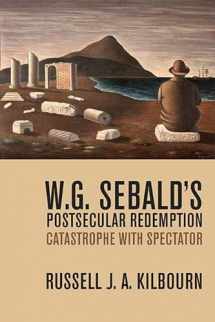
W. G. Sebald’s Postsecular Redemption: Catastrophe with Spectator
ISBN-13:
9780810138087
ISBN-10:
0810138085
Author:
Russell Kilbourn
Publication date:
2018
Publisher:
Northwestern University Press
Format:
Paperback
232 pages
FREE US shipping
Book details
ISBN-13:
9780810138087
ISBN-10:
0810138085
Author:
Russell Kilbourn
Publication date:
2018
Publisher:
Northwestern University Press
Format:
Paperback
232 pages
Summary
W. G. Sebald’s Postsecular Redemption: Catastrophe with Spectator (ISBN-13: 9780810138087 and ISBN-10: 0810138085), written by authors
Russell Kilbourn, was published by Northwestern University Press in 2018.
With an overall rating of 4.3 stars, it's a notable title among other
books. You can easily purchase or rent W. G. Sebald’s Postsecular Redemption: Catastrophe with Spectator (Paperback) from BooksRun,
along with many other new and used
books
and textbooks.
And, if you're looking to sell your copy, our current buyback offer is $0.6.
Description
Focusing on W. G. Sebald's four works of prose fiction—The Rings of Saturn, Vertigo, The Emigrants, and Austerlitz—Russell J. A. Kilbourn traces the author's abiding preoccupation with redemption in a world that has been described as postsecular. He shows that Sebald's work stands between modernism's ironic hopes for redemption and whatever comes after. Out of the spectacle of humankind's slow-motion self-destruction, a "Sebaldian subject"—masculine, melancholic, ironic, potentially queer-emerges across the four prose narratives. Alongside Sebald studies' traditional subjects, which include memory, historiography, Sebald's critique of an image-based culture, and his highly intermedial poetics, W. G. Sebald's Postsecular Redemption demonstrates Sebald's relevance for affect theory, new materialism, and the posthuman turn. It critiques the possibility of metaphysical or eroto-salvific models of redemption, arguing against the temptation of psychoanalytic interpretations, as Sebald's work of memory rejects the discourse of redemption in favor of restitution. In its consideration of Sebald's place in twentieth-century literature and after, Kilbourn's book engages with such predecessors as Nabokov, Kafka, Conrad, and Beckett, concluding with comparisons with contemporaries Claudio Magris and Alice Munro.


We would LOVE it if you could help us and other readers by reviewing the book
Book review

Congratulations! We have received your book review.
{user}
{createdAt}
by {truncated_author}


